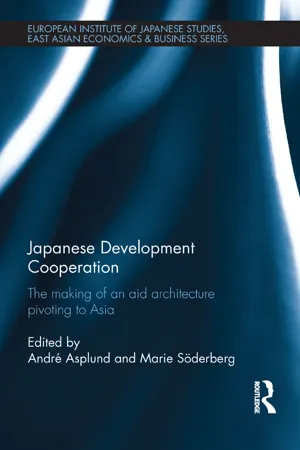
Japanese Development Cooperation
The Making of an Aid Architecture Pivoting to Asia
- 218 pages
- English
- ePUB (mobile friendly)
- Available on iOS & Android
Japanese Development Cooperation
The Making of an Aid Architecture Pivoting to Asia
About This Book
The world order as we know it is currently undergoing profound changes, and in its wake, so is foreign aid. Donors of foreign aid, development assistance or development cooperation around the world are already facing new challenges in the changing development architecture. This is an architecture that globally seems to become increasingly forgiving of foreign aid as a win-win concept that also meets the donors' own national interests—something that has been an unofficial Japanese trademark for many years.
This book examines Japan's development assistance as it transitions away from Official Development Assistance and towards Development Cooperation. In this transition, the strong and reciprocal relationships between Japanese development policy and comprehensive security, diplomacy, foreign, domestic and economic policies are likely to become even more consolidated and integrated. The utilization of, and changes within, Japanese development policy therefore affects not only recipients of foreign aid but also the relationships Japan enjoys with its allies and strategic partners, as well as the relations to competing donors and rivals in the region and around the world. Japanese foreign aid as such provides an extremely interesting case from where regional and even global changes can be understood. Written by a multidisciplinary team of contributors from the fields of political science, international relations, development, economics, public opinion and Japan studies, the book sets out to be innovative in capturing the essence of the changing patterns of development cooperation, and more importantly, Japan's role in within it, in an era of great change.
This book will be of great interest to students and scholars of Japanese Politics, Foreign Policy and International Relations.
Frequently asked questions
Information
Table of contents
- Cover
- Half Title
- Title Page
- Copyright Page
- Table of Contents
- List of figures
- List of tables
- Notes on contributors
- Preface
- Note on names and transcriptions
- List of abbreviations
- 1 Global change: Japan’s role in the making of a new aid architecture
- 2 The peculiarities of Japan’s ODA and the implications for African development
- 3 Aligning policy with practice: Japanese ODA and normative values
- 4 The development cooperation paradigm under the “new partnership” and its implications for Japan’s aid
- 5 The securitization of Japan’s ODA: new strategies in changing regional and domestic contexts
- 6 The US pivot to Asia and Japan’s Development Cooperation Charter
- 7 Japanese ODA and the challenge of Chinese aid in Africa
- 8 The changing global aid architecture: an opportunity for Japan to play a proactive global role?
- 9 Comparing Japan and the European Union: the development cooperation policies of two civilian powers
- 10 Network-based development cooperation as a way forward for Japan
- 11 The impact of public opinion on Japan’s aid policy: before and after the New Development Assistance Charter
- 12 An Asian aid paradigm: Japan leading from behind
- Index